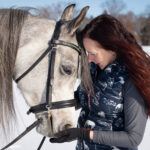I recently saw a meme on Facebook that said you are not a real rider until you have fallen off at least ten times. And then I realized that according to this meme I am not a real rider since I have less then 10 falls under my belt! Neither is Nicole! Nor are a majority of our students!
Falling off is something that riders love to talk about. It’s something that for many people is a routine occurrence. But not for us. We pride ourselves in our very low fall rate.
But why are falls such a rare occurrence for us? It certainly isn’t because we never do anything difficult with our horses. True, we don’t do extreme disciplines like racing or eventing but we don’t just stick to the easy stuff either. I frequently ride untrained and problem horses. We ride highly sensitive and energetic horses and do high level dressage with them including airs above the ground. In addition to the dressage, we trail ride, do low level jumping, garrocha, mounted archery, vaulting, and trick riding.
So what’s our secret? I’m going to share with you a few ways we reduce our fall rates.
Well trained horses
Dressage training provides a wonderful foundation for our horses. It gives us a much greater control over what our horses do and how they move and react. Dressage creates horses that are strong, balanced, and healthy and are therefore easier to ride. Dressage creates horses that are focused and attentive to the rider which greatly reduces spooking and other misbehaviors.
We also do a considerable amount of groundwork with our horses. This helps us develop a connection with them before we even get on their backs which leads to more focused and attentive horses. It also gives us a chance to see how our horse is feeling before we get on. Horses have bad days just like people do and if we notice that our horse is struggling during the groundwork we may elect to keep the ride easy or even not ride at all depending on the severity of the horse’s behavior.
Dressage provides a great foundation for the horse regardless of what disciple he is going to go on to.
Balanced riders
We spend a large amount of time with all of our riders developing a correct, balanced position in the saddle. This way if something unexpected does happen the rider is much more likely to be able to stay with the horse and ride through the challenge. Working on your position in lunge lessons is the best way to do this. Many riders are eager to skip ahead to the more exciting aspects of riding and never take the time to develop a strong position. This may get them by for awhile but is going to make it much easier for them to come unseated. Take the time to work on your position.
Knowing your limits
This is the most important especially if you are a newer rider who hasn’t yet developed a strong seat or you are working with a horse who isn’t as well trained. Many of the falls I’ve seen have been a result of a rider doing something that was too advanced for them, for example cantering out on the trail when they don’t have good control and balance in the arena yet. Along with that is making sure that the horse is an appropriate level for the rider. As the saying goes green and green makes black and blue. It’s always better for a newer rider to ride a more experienced, lower energy horse. This also goes for knowing your horse’s limits. Don’t push your horse physically or mentally to the point where he feels like he needs to defend himself by running off, bucking, rearing, etc. It’s important to recognize when you need to back off. If you and your horse are getting frustrated and upset it’s best to work on something else. Doing something easier can put you both in a better frame of mind and can keep you safe. Learn to recognize when your horse is scared, frustrated, confused, or physically tired or unable to complete your request.
Pushing your limits is important. It’s how you grow and improve as a rider. But going past your limits puts you in danger. It’s important to recognize the difference.
And last but not least-
Always make sure you tighten your girth before getting on! I’ve seen quite a few people fall off simply because their girths weren’t tight enough! Always double check!
By following these practices we have been able to keep our fall rate very low. Of course accidents do happen and every rider will eventually fall off a few times, especially when you are first getting started, but it is not something that should be a regular occurrence.
Interested in learning more? We offer lessons and training and can show you how to develop your horse’s training and your own balance so you can stay in the saddle! Leave a comment or send us a message and we’ll help you get started!

